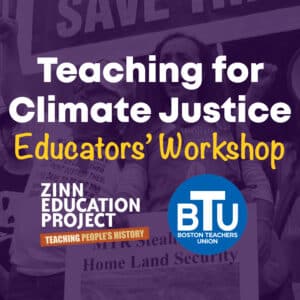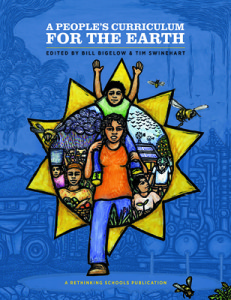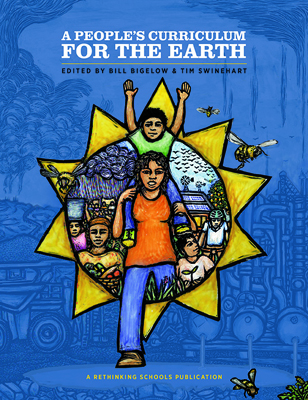 What does it mean to teach for climate justice? How can educators combat climate despair?
What does it mean to teach for climate justice? How can educators combat climate despair?
Those were the key questions addressed in a half-day online workshop hosted by the Boston Teachers Union Climate Justice Committee and facilitated by the Zinn Education Project on March 11, 2023.
Facilitators Tim Swinehart (high school teacher and co-editor of A People’s Curriculum for the Earth) and Suzanna Kassouf (high school teacher and co-founder of Sunrise Movement PDX), led participants through classroom activities available and forthcoming from the Zinn Education Project’s Teach Climate Justice campaign and Rethinking Schools.
In the first portion of the workshop, participants were introduced to a newly updated version of Stories from the Climate Crisis: A Mixer, by Bill Bigelow, an activity illustrating the varied and unequal impacts of the climate emergency around the world. One participant said of the activity, “Just fascinated by the connections between things. Activism in Miami and in the Arctic. Connections to health care injustice. It’s quite a web.” Another participant remarked how water emerged as a theme across stories:
 Lots of connections to water: a lack of it (for Mustafa Abdul Hamid, Syrian refugee), to the fear that it’ll go away (Nancy Tanaka in Mt. Hood, Oregon), to having too much of it in the form of floods (Trisha Kehaulani Watson, Hawai’i).
Lots of connections to water: a lack of it (for Mustafa Abdul Hamid, Syrian refugee), to the fear that it’ll go away (Nancy Tanaka in Mt. Hood, Oregon), to having too much of it in the form of floods (Trisha Kehaulani Watson, Hawai’i).
Articulating a critical attribute of what it means to teach toward climate justice (as opposed to just climate literacy), one participant noted:
I can see how this activity would be helpful in pushing students past blanket climate justice statements to think critically about how people, in particular people who have already been marginalized, will be — and are — impacted differently.
In the second portion of the workshop, Suzanna and Tim led educators through a new activity, “Imagining the Future,” forthcoming from Rethinking Schools in Spring 2023. The role play lifts up the stories of activists organizing for justice in different arenas: housing, land, immigration, Indigenous rights, environment, labor. Participants learn about the work of Leah Penniman, founder and owner of Soul Fire Farm; Cheyenne Antonio, Diné activist from The Red Nation; Alma Maquitico, co-director of the National Network for Immigrant and Refugee Rights; Tiana Caldwell, organizer with Kansas City Tenants; Norman Rogers, Second Vice President of the United Steelworkers Local 675 in Los Angeles; and Sharon Lavigne, a special education teacher turned environmental justice activist working in “Cancer Alley,” in Louisiana.
Rather than focusing on the climate emergency’s devastating impacts, “Imagining the Future,” asks a different question: What if these activists won?
Participants come together in small groups to discover how the organizers’ visions intersect with one another, and to imagine the world as it could be. In the midst of the activity, Suzanna asked, “What emotion comes up for you so far in this activity?” Answers poured into the Zoom chat:
“Joy!”
“Hopeful.”
“Hope.”
“Hope.”
“Hope.”
“Hope.”
“Engaged — ready to do more.”
“Energized.”
“Imagination work is hard work!”
“Connected.”
“Inspired.”
“Fed.”
These answers affirmed the workshop’s message to educators: The magnitude of the climate crisis means all educators, no matter grade-level or subject area, must address the realities of how it crashes through people’s lives; but we also must inoculate students against despair and resignation by foregrounding the activists who demonstrate that you don’t stop fighting when things are grim — you fight harder.
More Comments from Workshop Attendees
I learned to teach climate justice from a whole different approach. I am a science teacher, so definitely needed resources to bring up and address the human impacts of climate change, and the injustices that are a result.
I learned the importance of connecting with other teachers about how we are teaching climate justice. I got so much out of the conversations. I am leaving feeling very inspired.
It always feels good to meet with other educators working to include climate justice into their curriculum and taking on a critical and systemic approach/perspective. I am also feeling more confident to implement these lessons in my classroom.
I learned the importance of creating space in the classroom for radical imagination and visioning. The visioning exercise was such a powerful and hopeful way to end a unit on climate justice.
I learned how to connect the struggles of different people to common causes; I learned that there are other educators like me, aching to teach social justice in effective ways.
I appreciated the deep dive into frontline community issues and leaders who fight for them. It was great to make connections with teachers much further ahead who can share resources and practices.
Being led by two social studies teachers changed my perspective of how climate curriculum can cut through some of the subject siloing that happens in curriculum. I loved the group freedom dreaming/science fiction visioning board!
This was one of the best-planned and paced Zoom PD sessions I’ve ever been in, and I appreciate that this cross-continental collaboration is made possible by Zoom.







Twitter
Google plus
LinkedIn